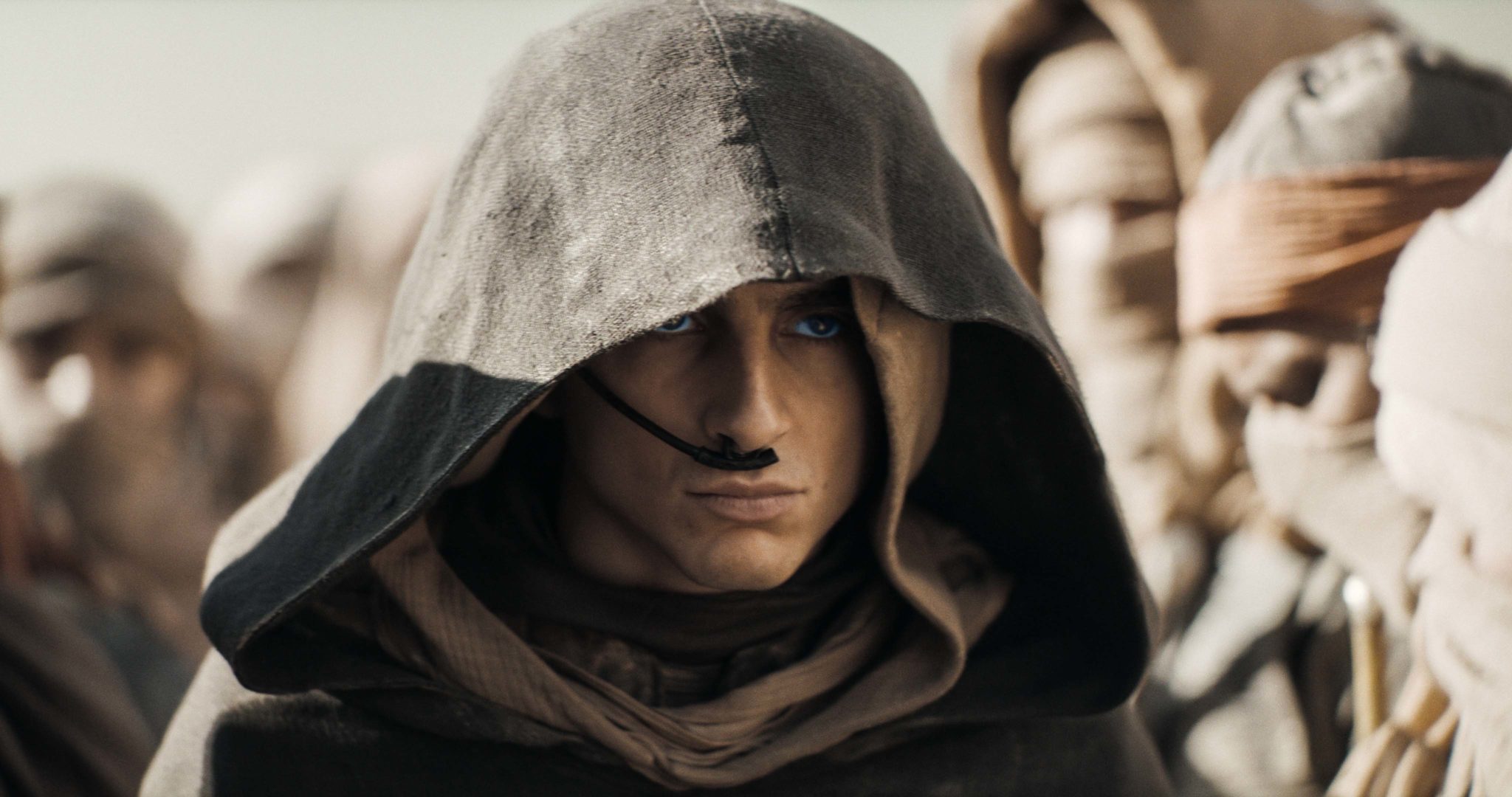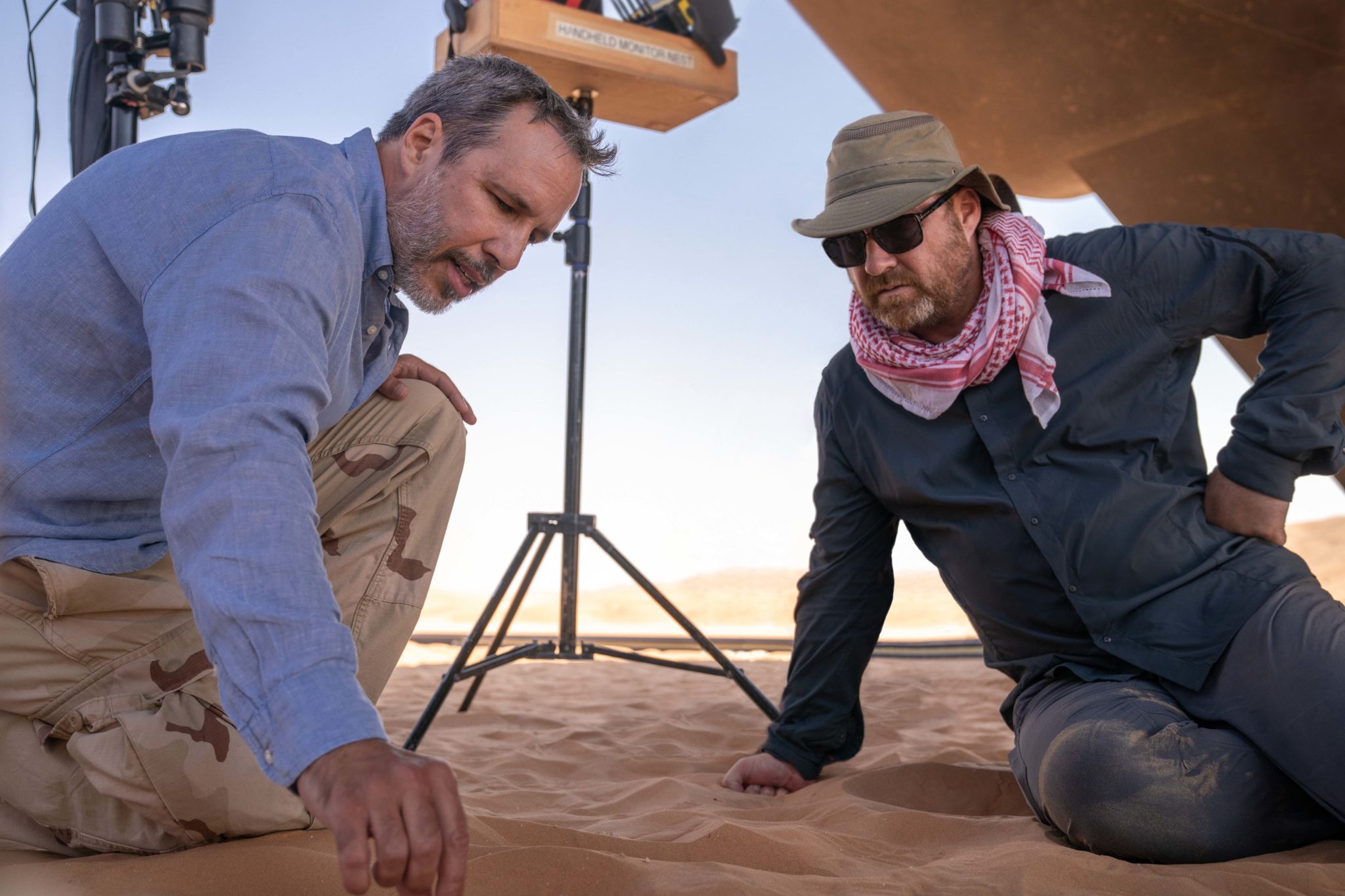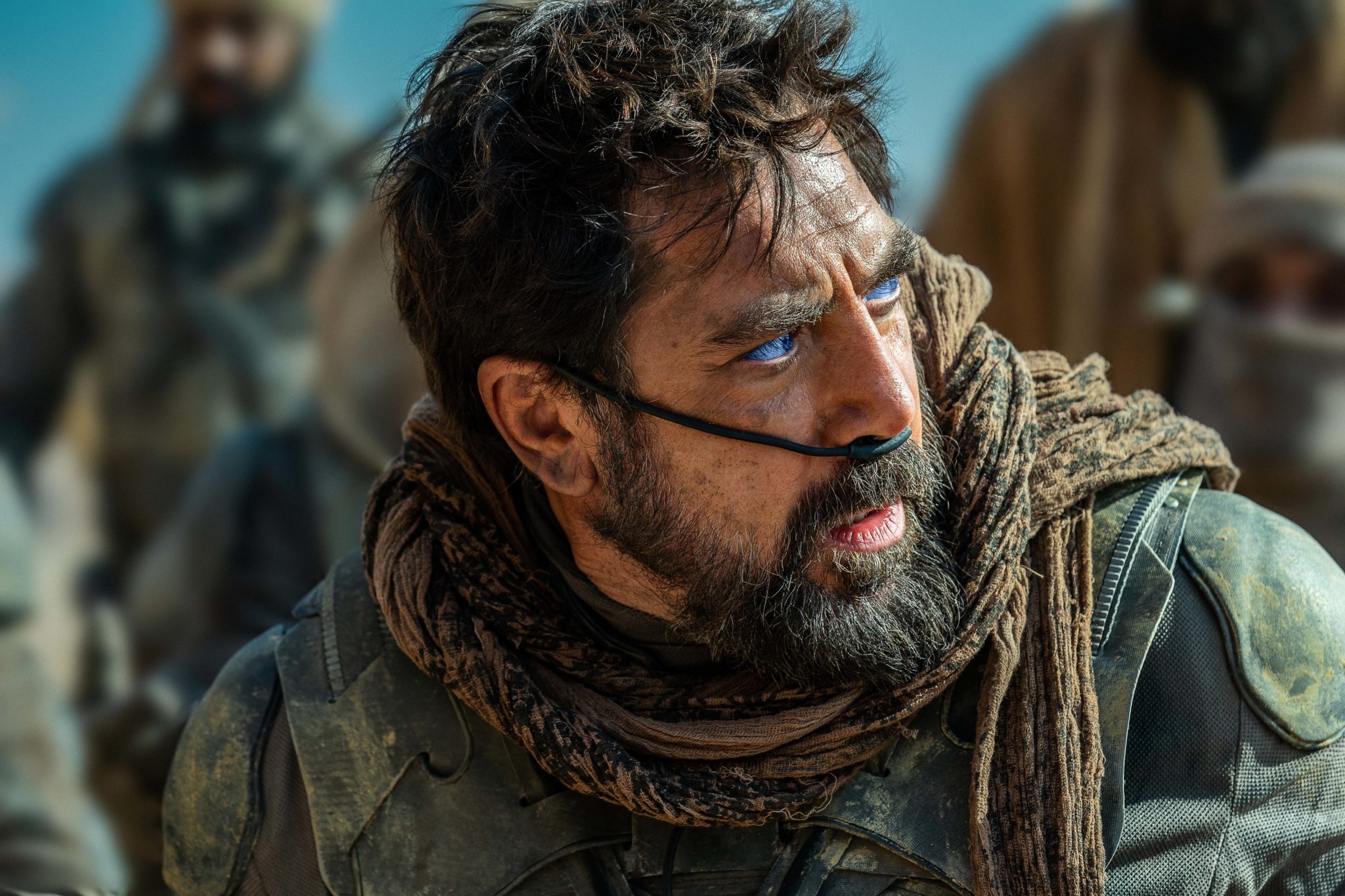- Film And TV
- 01 Mar 24

Austin Butler and Stellan Skarsgård discuss their roles in one of the year’s most hotly awaited movies, blockbuster sci-fi epic Dune: Part Two.
For what was known as the unfilmable novel, Dune has certainly disproved naysayers. When it was announced that director Denis Villeneuve was going to adapt Frank Herbert’s intimidating sci-fi tome, many cinephiles were wary, having been stung in the past with David Lynch’s 1984 adaptation which starred Kyle MacLachlan, Patrick Stewart and Sting, and was largely regarded as flawed and disjointed.
For others, Villeneuve was the perfect choice, known for his bold, luscious visuals (Blade Runner 2049), tense action and pacing (Sicario), and for imbuing sci-fi stories with deep emotional resonance (Arrival). In 2021, when the pandemic had left audiences desperate for an excuse to return to the cinema and experience the joy of an immersive epic, Dune was waiting – and it was wonderful.
Smartly only tackling one manageable section of the story, the introduction of Paul Atreides (Timothee Chalamet) and the rivalry between the houses of Atreides and Harkonnen over control of the trade of ‘spice’ – a sacred substance that prolongs life and assists in interstellar travel – the first installment tackled clear colonial plots and set up rivalries and allies. It also gave audiences someone to root for: the integrity-fuelled Paul, who wants to do what is right – and to meet the girl of his literal dreams, Chani (Zendaya).

The latter is part of the desert-dwelling Fremen people, who protect the spice. Greif Fraser’s incredible cinematography created a sense of otherworldly grandeur while storms, sandworm attacks and heist sequences kept the unfurling story exciting – for most people. Some detractors found Villeneuve’s trademark meditative pacing too slow and were eager for more action – and those are the very people who are going to adore Dune: Part Two.
Advertisement
Villeneuve’s second installment has been described by the director as “more muscular”, with more propulsive action and reenactments of some of the book’s most beloved scenes. Early footage was shown to critics at the start of the year, and scenes of Paul learning to ride a giant sandworm through the desert are utterly thrilling, as are the gladiatorial battle sequences fearing Feyd-Rautha (Elvis star Austin Butler), nephew of the Machiavellian Baron Vladimir Harkonnen (Stellan Skarsgård).
As a younger man and potential heir of the house of Harkonnen, Feyd-Rautha acts as a violent, merciless, power-hungry enemy of and foil to Paul Atredies, showing the corrupting force of greed and what Paul’s destiny could be if he succumbs to corruption and blind vengeance.
Butler is having the year of his life, the former Nickelodeon star fresh from his Oscar-nominated performance as Elvis in Baz Luhrmann’s kaleidoscopic biography of the singer. For good measure, he’s already receiving rave reviews for his role in Jeff Nichols’ upcoming biker gang drama, The Bikeriders. However, fans who worship not only Butler’s onscreen charisma, but his classic good looks, may be somewhat shocked by his appearance in Dune: Part Two, as the 32-year-old is utterly unrecognisable.
Featuring a shaved head, prosthetics that eliminate his eyebrows, a vampiric complexion and eerie black teeth, Feyd-Rautha is a fiercely intimidating villain, which Villeneuve has described as a “cross between a psychopath killer, an Olympic sword master, a snake, and Mick Jagger.” Butler was immediately onboard.
“I had a blast!” the actor enthuses. “It was very exciting for me, because I got to see the first film, and immerse myself in the world that Stellan and the entire team had created. So what we get to see in this film is a character who is hungry for power, and has grown up with his uncle, the Baron, as his role model. You get to see the brutality of that world they live in, and a little bit more of what makes them tick, which is very exciting for me.”
Butler read Dune when he was younger, and dusted off his copy when Villeneuve asked to him to join the new iteration, without even needing the star to audition. Butler admits to being intimidated by the legacy of the story and how cherished it is by fans – and by taking over a role formerly played by Sting.
“I’d read the book when I was a teenager, but it had been so long since I’d cracked it open,” he reflects. “So when Denis said he was coming into town and wanted me, I dusted it off and read it again, along with rewatching the first film and David Lynch’s movie. But what I loved about what Denis did, was that his vision was completely singular. He’s not going to any other material but the book and his own imagination, and the collective imagination of all the heads of department, who are just so brilliant. And, of course, all the actors that he’s brought on board.
Advertisement
“So yeah, I was just thrilled because Denis is truly one of my favourite filmmakers of all time. He’s just brilliant and I knew this was going to be amazing. All these actors involved are my heroes, so it was a no-brainer for me.”
Butler has never played a villain before, and while some actors speak of feeling a heaviness or weight when inhabiting the role of sadistic characters, he found it thrilling and exciting. He notes that, while he has come to fully inhabit characters in the past, and understands how actors playing sociopathic characters could become emotionally drained, the world of Dune is so fantastical, it’s easier to keep the boundaries between acting and real life separate.
“It was a great joy for me,” he says, some of the slow drawl he mastered for Elvis still coming through in his voice. “It’s interesting, because Feyd doesn’t see himself as a villain – it’s all that he’s ever known. It’s sort of akin to a fish that doesn’t realise they’re in water; I don’t know if he realises that he’s in darkness. He’s just in the only world he’s ever known, doing what he has been taught to do. So how he relates to other people is not even close to how I, Austin, relates to people.
“And because of the creative vision of Denis, the world that he creates feels completely singular, which makes it feel safe to go into the space of the character. Because it’s so vastly different from the world that we walk around in every day, visually and energetically. So for me, it was just a joy to go into that space and play.”

Director Denis Villeneuve and Production Designer Patrice Vermette on set
Butler’s playfulness was a great relief to Stellan Skarsgård, who has spent decades making some incredibly dark films – and having an absolute whale of a time doing so. Now 72, the prolific and highly regarded Swedish actor is a longtime collaborator of Lars Von Trier, having appeared in Dancer In The Dark, Dogville, Melancholia and Nymphomaniac. He also starred in David Fincher’s thriller The Girl With The Dragon Tattoo and the acclaimed HBO miniseries Chernobyl. But despite often appearing in thematically heavy films, the wry and mischievous Skarsgård is always determined to have a good time on sets. Indeed, he’s happiest when collaborating with actors who are serious about their work ethic, without taking themselves seriously.
Advertisement
“Oh, you have to have fun,” he says. “When you shoot darkness, you make that even more horrible – and then the more fun you have when you stop shooting! It’s not that you’re sort of staying in it between scenes, sitting around thinking, ‘Oh God, this is terrible’ – it doesn’t work. There’s nothing as fun as working with a good actor that you trust.
“Because you play ping pong, you know? You throw the ball and it comes back to you, even when you don’t know what weight comes back or with what force. It’s constantly surprising and incredible fun. Austin was so much fun to work with. And the thing is, our characters don’t do too much – we don’t say too much, we don’t do much with each other, but I think the relationship is there.”
Feyd and the Baron’s silent and deadly characters may not say many words to each other on screen, but they are defined by each other. The Baron’s influence on Feyd is unmistakable, having trained his nephew to become a killing machine. As in the first film, the Baron’s presence as a large, oil-slicked, constantly scheming puppet-master is all the more threatening for his reticence – he gives little away before uttering brief commands that destroy lives. Skarsgård loves this approach to the character, praising Villeneuve’s command of silence in his films.
“Something I have often said is that he’s a fantastic director, who trusts the actor’s ability to convey things without speaking,” says the actor. “I mean, in many scenes of his films, there’s almost no dialogue. He works with the atmosphere and the actors, and creates this strange dance with them. A very electric atmosphere comes out of it.”
Skarsgård appreciates both the freedom and the challenge that comes with showing, rather than telling, a story onscreen.
“I think that film acting, compared to TV acting or stage work, is not very verbal,” he considers. “It’s not in the lines, or it shouldn’t be in the lines. It needs to be in the face, the cutaways, what the character does or betrays, rather than says.”
So we shouldn’t expect Skarsgård to pop up in an Aaron Sorkin film any time soon, then?
Advertisement
“Oh, I can’t do Aaron Sorkin,” says Skarsgård. “I can’t do the fucking learn-the-page, walking and talking and doing precision, like four pages. I can’t do it, I’m not good at that. He’s extremely talented in what he does, but even if I work with a director that is tied to exposition or the verbal side of things, I try to cut down the lines myself. I’m fighting for the beauty of the silent movie!”
Dune: Part Two sees the return of established actors such as Charlotte Rampling, Rebecca Ferguson, Josh Brolin, Dave Bautista, Javier Bardem and Oscar Isaac, with Christopher Walken joining the cast as well. The ensemble also features some of Hollywood’s hottest young stars, with Zendaya and Timothee Chalamet being joined by not only Butler, but also Florence Pugh and Lea Seydoux. Skarsgård, who has several actor offspring, says he loves working with younger actors and benefitting from their talent and enthusiasm – but says he would never dream of giving them any advice.
“Oh, I don’t give advice, even to my children!” he laughs. “I don’t advise them of anything. The talent is undeniable and where it will take them, I don’t know. It’s fantastic to see them grow in front of you, I’m very happy.”
He does note however that the landscape of filmmaking is so different than when he started, not only in terms of how the press covers actors, but the very business model of cinema itself, and the variety and scope of projects that are getting financed. Skarsgård ponders what his relationship with film would be if he was, like his young co-stars, beginning his career now.
“It’s so different now,” he muses. “We don’t know what the future of film is. For years now, all the mid-level budget films have been erased, it’s only been Marvel films. And they have their value, but they are just popcorn. It’s a very scary and interesting time now. When the streamers are consolidating, will they have absolute power in five years? Will there be any cinemas in five years? I think there will be, because TV doesn’t seem as fun as sitting in the cinema with people and sharing the experience. But it’s tough.”
While Skarsgård may not be explicitly doling out advice to his younger co-stars, Butler says he was still learning from his on-screen uncle as well as his other co-stars, soaking in everything he could.
“I have a constant desire to learn,” he emphasises. “I hope I’m always maintaining that feeling of, ‘I’m only just beginning’. Getting to be around powerhouse actors like Christopher Walken, Josh Brolin and Javier Bardem, and the other younger actors like Timothy, Zendaya and Florence, was so inspiring. There’s so much to learn from each one of these incredible artists.”
Advertisement

Films always exist within the culture and context that surrounds them, and Dune: Part Two is grappling with ideas of power, oppression, greed, war and valuing resources over people and life. This year, these themes seem to hit harder than before, as the world is witnessing genocide and destruction on unthinkable scales. As audiences turn to art either to escape the world or understand it – or a combination of both – I wonder what the actors hope audiences will leave Dune: Part Two thinking about?
“It’s very hard,” says Skarsgård. “It’s not a political film in a more conventional sense. Of course it is political. It is there, because it is about power, the abuse of power. It’s about those clans that are fighting you like Renaissance houses and using Machiavellian tools. But it’s more of a poetic thing, I think. Poetry has to exist in the world at the same time as we fight for equality and human rights and everything. We cannot say no to poetry, because then we have nothing to fight for.
Dune: Part Two is in cinemas from today, March 1. Read Paul Nolan’s piece on Denis Villeneuve and the Dune franchise here.










